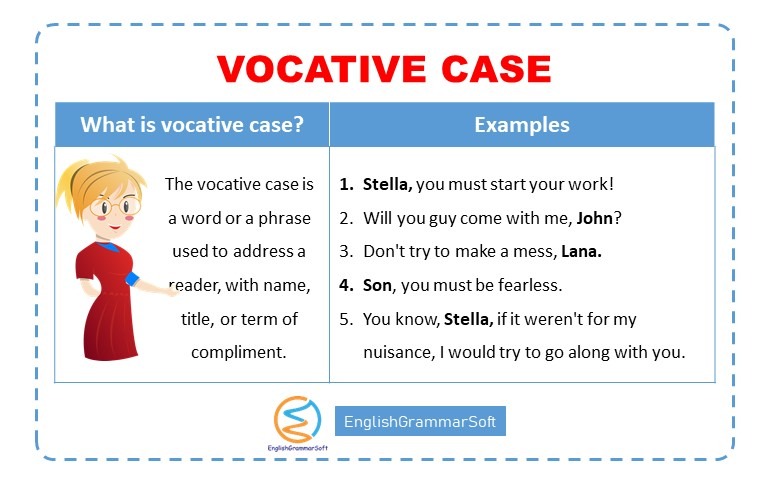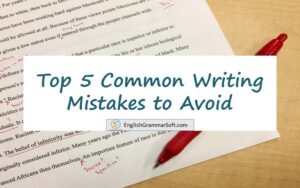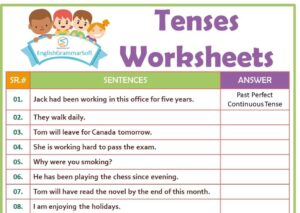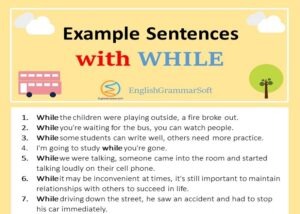How to Identify a Vocative Case in an English Sentence?
The vocative case is a word or a phrase used to address a reader, with name, title, or term of compliment. Here the time of address would set off in the sentence with the help of vocative commas. It stated that the grammar term for a sentence that uses a vocation is a term as a vocative case.
Let’s take an example:
“I have no idea of chess books opinion, Sara,“Sara is a vocative expression that indicates the whole party that has an address. Where “Sara” is the direct object of the verb “opinion.”
Examples
- Stella, you must start your work!
- Will you guy come with me, John?
- Don’t try to make a mess, Lana.
- Son, you must be fearless.
- You know, Stella, if it weren’t for my nuisance, I would try to go along with you.
Key points:
- Whenever you are addressing someone with their names, you are using a vocative case.
- While writing a sentence with a direct address, you use vocative commas to set off the name.
- When a vocative sentence starts with “you,” it is more likely to be negative.
How can you use a vocative case?
Suppose you use a direct address, where you need to define someone directly. Using a person’s name would get attention and show respect and emotion. While using terms of endearment and derogatory names would be a great sign of emotions in the vocative case. The vocative case can be a proper noun and noun phrase.
Examples
- Mona, do you want to have fun with me?
- Thank you so much, Sona.
- I have no idea what I’d be able to do without you, Sim!
- Well, dentist, what’s your opinion?
- Sir, I have a query.
- Father, we need to have a conversation.
- Where are you from, my pumpkin?
Here you would see that the sentences have you in them because of the direct address where objects would use in the vocative case as long as the sentence is correctly using.
Oh, keys, where did I put you?
Stella, why don’t you stop chewing?
Negative associative side
In vocative phrases, the structure usually starts with “you” + adjective + noun. The sentences could be harmful such as you bloody fool, and so on. They can use a lot many negative words to associate with “you.” These sentences are in terms derogatory.
- Get out of my home, jerk.
Vocative comma
You write the person’s name and terms of endearment with a comma at the sentence’s start or end. Furthermore, you can use two commas if the word is in the middle of the sentence. While speaking, there comes a pause where the comma write.
When do you need to avoid a vocative comma?
Here it is stated that not each person’s name or title is the direct address. Speaking or writing in the third person, such as he/she/it, is not the vocative case or direct address. Whereas the commas are not here used to set off the name.
Let’s discuss the sentences where they still used the third form to refer to the person.
- Stella went to the university along with me.
- I am thankful to my friend for the help.
- I have no idea what I would do without Tim.
- I asked the dentist what his prescription was.
- I had a query for the sir.
- He wanted to have a conversation with his father.
- Where is my little pumpkin?
Example
Direct address is related to talking to Tim:
I have no idea, Tim.
Not direct address related to talking about Tim:
I told to Tim that I have no idea.
Use commas carefully
Be attentive to know when using the vocative comma in the middle of a sentence. Here we see the name is not a conjunction that can merge two independent clauses.
Example
Incorrect
Thank you, Tim; I have no idea what I do without you.
Correction:
Thank you, Tim. I have no idea what I do without you.
Or:
Thank you. Tim, I have no idea what I do without you.
Boom Line
Hopefully, the details mentioned above are associated with the article ” How to Identify a Vocative Case in an English Sentence? It would help you understand the topic carefully.






